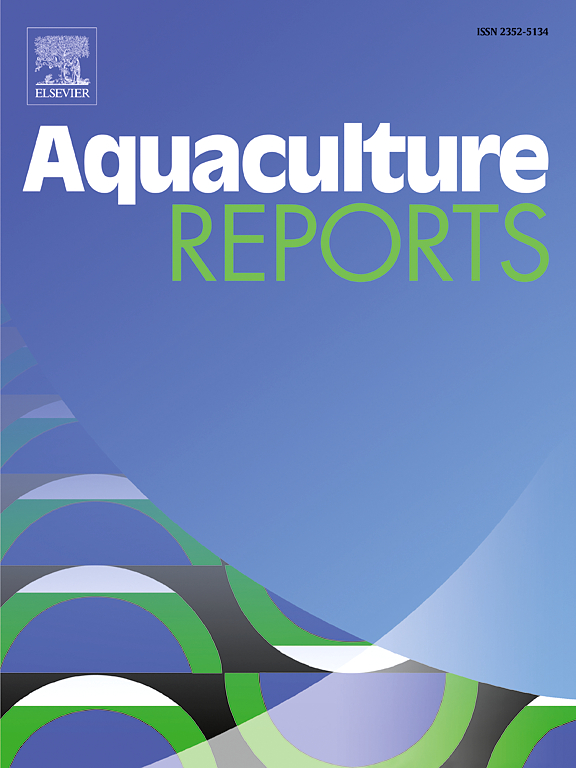苜蓿改善太平洋南美白对虾(Litopenaeus vannamei)的生长性能、存活率、体质和脂肪酸组成、肉质和免疫抗氧化系统
IF 3.2
2区 农林科学
Q1 FISHERIES
引用次数: 0
摘要
苜蓿是水产养殖物种日粮中的一种合适的食物,提供有价值的营养成分、成本效益、广泛可用性和可持续的生产实践。本试验研究了饲粮中添加苜蓿叶粉(ALP)对凡纳滨对虾(Litopenaeus vannamei)生长性能、存活率、体和脂肪酸组成、虾青素含量、肉品质和免疫-抗氧化系统的影响。选取初始平均体重为7.58 ± 0.10 g的健康对虾1050只,分别饲喂ALP含量为0(对照)、60 (ALP60)、120 (ALP120)和180 (ALP180) g/kg的饲料,为期8周。结果显示,与对照组相比,ALP60处理显著改善了生长指标(p <; 0.05)。此外,与对照组相比,所有alp饲料对虾的存活率均显著提高(p <; 0.05)。ALP180处理的胴体蛋白质水平最高,脂肪水平最低。脂肪酸组成显示,各ALP处理的C14:0水平均低于对照组,而ALP120和ALP180处理的ALA、总(n-6)脂肪酸和EPA水平均高于对照组(p <; 0.05)。在ALP120和ALP180处理中,虾青素水平、肉质(红度指数)和免疫抗氧化酶(超氧化物歧化酶、谷胱甘肽过氧化物酶和溶菌酶)活性均显著提高。此外,ALP的补充降低了血淋巴胆固醇和葡萄糖水平。综上所述,本研究表明,饲粮中添加ALP对虾的生长、存活、体组成、虾青素含量、肉品质和免疫功能有积极影响,显示了其改善虾健康和品质的潜力。本文章由计算机程序翻译,如有差异,请以英文原文为准。
Dietary alfalfa improved growth performance, survival, body and fatty acid composition, flesh quality and immune-antioxidant system in Pacific white shrimp (Litopenaeus vannamei)
Alfalfa is a suitable food item in the diet of aquaculture species, offering valuable nutritional components, cost-effectiveness, widespread availability, and sustainable production practices. This study investigated the effects of dietary alfalfa leaf powder (ALP) on growth performance, survival, body and fatty acid composition, astaxanthin content, flesh quality, and the immune-antioxidant system of Pacific white shrimp (Litopenaeus vannamei). A total of 1050 healthy shrimp with an initial mean weight of 7.58 ± 0.10 g were fed diets containing 0 (control), 60 (ALP60), 120 (ALP120), and 180 (ALP180) g/kg of ALP for eight weeks. Results showed significantly improved growth indices in the ALP60 treatment compared to the control group (p < 0.05). Additionally, all ALP-fed shrimp showed significantly higher survival rates compared to the control group (p < 0.05). The highest carcass protein and lowest lipid levels were observed in the ALP180 treatment. The fatty acid composition showed that C14:0 levels were lower in all ALP treatments compared to the control, while ALP120 and ALP180 treatments had higher ALA, total (n-6) fatty acids, and EPA levels compared to the control group (p < 0.05). It also increased astaxanthin levels, meat quality (redness index), and the activity of immune antioxidant enzymes (superoxide dismutase, glutathione peroxidase, and lysozyme), especially in ALP120 and ALP180 treatments. Furthermore, ALP supplementation reduced hemolymph cholesterol and glucose levels. Overall, this study demonstrates that dietary ALP positively influences growth, survival, body composition, astaxanthin content, flesh quality, and immune function in shrimp, highlighting its potential to improve shrimp health and quality.
求助全文
通过发布文献求助,成功后即可免费获取论文全文。
去求助
来源期刊

Aquaculture Reports
Agricultural and Biological Sciences-Animal Science and Zoology
CiteScore
5.90
自引率
8.10%
发文量
469
审稿时长
77 days
期刊介绍:
Aquaculture Reports will publish original research papers and reviews documenting outstanding science with a regional context and focus, answering the need for high quality information on novel species, systems and regions in emerging areas of aquaculture research and development, such as integrated multi-trophic aquaculture, urban aquaculture, ornamental, unfed aquaculture, offshore aquaculture and others. Papers having industry research as priority and encompassing product development research or current industry practice are encouraged.
 求助内容:
求助内容: 应助结果提醒方式:
应助结果提醒方式:


